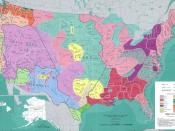Since the 1980?s, there has been a big controversy as to whether Native American tribes should be able to own and operate casinos or not. With 43 gaming tribes hosting some form of gambling, California has more gambling tribes than any other state. With that in mind, there are some who question the sovereignty of Indian nations, whether they should be allowed to operate casinos, and if they actually help their communities and surrounding areas.
Should Native Americans be subjected to the same policies and laws as non-Indian Americans? Or, as a sovereign nation, do they have separate rights? In a study done by the Institute of Governmental Studies at the University of Berkeley, they found that while the U.S. government recognizes Native American tribes as sovereign nations, the U.S. Congress ?is recognized by the courts as having the right to limit the sovereign power of the tribes.? Yet, on the other hand, the Indian Reorganization Act passed in 1934, remains the basic legislation concerning Native Americans today, allowing for the formation of tribal governments under federal authority as vehicles for self government.
So, while Native American Nations are recognized as sovereign nations, they only have as much self governing power as the U.S. government allows them.
One of the main reasons people question Indian sovereignty is because they want to question whether or not tribes should be able to own an operate casino?s. In November of 1998, the question of whether or not Indian gaming should be allowed in California was answered when California passed proposition 5, which required the governor to approve any tribal casino proposal. However, on August 24, 1999, the California Supreme Court, supposedly under pressure from Nevada casinos, overturned Proposition 5, saying that it violated the 1984 Lottery Act, which banned casino style gambling in...


